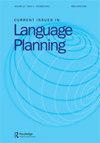拉脱维亚高等教育中拉脱维亚语、英语和俄语的国家政策制定者:通过论证分析的视角进行的语言意识形态辩论
IF 1.8
1区 文学
Q2 EDUCATION & EDUCATIONAL RESEARCH
引用次数: 1
摘要
摘要本文调查了拉脱维亚国家决策者在高等教育中对拉脱维亚语、英语和俄语的立场。通过论证分析,该研究探讨了政策制定者在两次公开辩论中的声明:关于使用俄语作为教学语言(2018年5月至2020年6月)和关于使用英语作为博士论文语言(2019年11月至12月)。论文表明,政策制定者之间的主要意见分歧是关于国家在大学语言政策中的作用。通过关注政策制定中的话语要素,概述了学术界对语言使用的四种回应:首先,占主导地位的国有化话语,它得到了加强,以坚持国家需要继续其国有化语言政策;其次,全球化话语,表现在同一决策者的声明中,以证明国家支持英语,而不是俄语;最后两篇文章强调,大学应该自主实施自己的语言政策,但其中一篇文章仅用于主张机构自主,而另一篇文章则将自主与学术界将俄语视为一种权利和资源而非问题的论点联系起来。本文章由计算机程序翻译,如有差异,请以英文原文为准。
State policymakers on Latvian, English, and Russian in higher education in Latvia: language ideological debates through the lens of argumentation analysis
ABSTRACT This paper investigates the positions of state policymakers in Latvia on Latvian, English, and Russian in higher education. By using argumentation analysis, the study explores policymakers’ statements in two public debates: on the use of Russian as a medium of instruction (May 2018–June 2020) and on the use of English as a language of doctoral theses (November–December 2019). The paper shows that the main difference of opinion among policymakers is about the role of the state in university language policies. Through a focus on the discursive elements in policymaking, four responses to language use in academia are outlined: firstly, the dominant nationalising discourse, which is reinforced to insist on the need for the state to continue with its nationalising language policies; secondly, the globalising discourse, which is manifested in the statements of the same policymakers to justify the state’s support to English, but not Russian; the final two discourses emphasise that universities should be autonomous to implement their own language policies, yet one of these is solely used to argue for institutional autonomy, whereas the other links autonomy with arguments that suggest construing Russian in academia as a right and a resource, not as a problem.
求助全文
通过发布文献求助,成功后即可免费获取论文全文。
去求助
来源期刊

Current Issues in Language Planning
Multiple-
CiteScore
4.80
自引率
16.70%
发文量
26
期刊介绍:
The journal Current Issues in Language Planning provides major summative and thematic review studies spanning and focusing the disparate language policy and language planning literature related to: 1) polities and language planning and 2) issues in language planning. The journal publishes four issues per year, two on each subject area. The polity issues describe language policy and planning in various countries/regions/areas around the world, while the issues numbers are thematically based. The Current Issues in Language Planning does not normally accept individual studies falling outside this polity and thematic approach. Polity studies and thematic issues" papers in this journal may be self-nominated or invited contributions from acknowledged experts in the field.
 求助内容:
求助内容: 应助结果提醒方式:
应助结果提醒方式:


